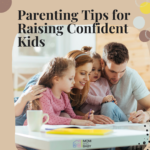Parenting tips for infants is a joyful yet challenging journey, especially during the first year. From understanding newborn care tips to navigating the hardest age to parent, preparation is key. By equipping yourself with practical tips and essential skills, you can build a loving and supportive environment for your newborn.
Below, we answer common questions and provide actionable advice to help you through this rewarding stage of parenting.
What Are Parenting Tips for Infants?

Parenting tips for infants include focusing on bonding, understanding your baby’s needs, creating a routine, and prioritizing their safety and health. Patience and consistency are crucial as you nurture their development and build confidence in your parenting skills for newborns.
1. Newborn Care Tips for the First Month
In the first month, newborns require gentle care and constant attention. Focus on feeding, diapering, and creating a safe sleeping environment. Skin-to-skin contact strengthens your bond and comforts your baby.
Additionally, establish a feeding schedule, ensure proper burping after meals, and monitor diaper changes to track their health. Remember to care for yourself as well—rest and self-care make you a more present and patient parent.
2. What Is the Hardest Age to Parent?
Every stage of parenting has unique challenges, but the newborn phase can be particularly tough due to sleepless nights, feeding demands, and constant vigilance. Understanding your baby’s cues makes this phase more manageable.
It’s also helpful to seek support from family or friends and remember that it’s okay to ask for help. As babies grow, challenges evolve, but building a strong foundation in infancy helps you navigate these stages confidently.
3. Parenting Skills for Newborns
Key parenting skills for newborns include patience, adaptability, and attentiveness. Learn to recognize their cues for hunger, sleep, or discomfort to meet their needs effectively.
Mastering swaddling, soothing techniques like rocking, and understanding safe sleep practices are essential. Building confidence in these skills not only benefits your baby but also helps you feel more secure as a parent.
4. How to Bond With Your Infant
Bonding with your infant is essential for their emotional and social development. Engage in activities like eye contact, talking softly, and gentle touch to create a connection.
Routines such as reading, singing lullabies, or bathing together can enhance your bond. Babies thrive on love and attention, so make these moments a regular part of your day.
5. Creating a Safe Environment
Safety is a top priority during infancy. Ensure your home is baby-proofed with measures like outlet covers, corner guards, and secured furniture. Use a firm, flat mattress for sleep and always place your baby on their back.
Regularly inspect toys and baby gear for safety. Staying informed about recalls and safety guidelines ensures your baby’s environment is secure.
FAQ: Parenting Tips for Infants

1. What are the most important newborn care tips?
Focus on feeding, safe sleep, skin-to-skin bonding, and maintaining hygiene. Monitor your baby’s cues to meet their needs effectively.
2. What is the hardest age to parent, and why?
The newborn phase is often hardest due to sleepless nights and constant care. However, consistent routines and support can ease the challenges.
3. How do I develop parenting skills for newborns?
Practice patience, learn your baby’s cues, and seek advice from trusted resources. Experience builds confidence over time.
4. How can I bond with my infant?
Engage in activities like skin-to-skin contact, gentle talking, and creating daily routines. Love and attention strengthen your bond.
Conclusion
Parenting infants is a transformative experience filled with challenges and rewards. By focusing on newborn care tips, honing essential parenting skills, and creating a safe, nurturing environment, you can confidently navigate this precious stage. Remember, every small effort contributes to your baby’s growth and strengthens your bond.



